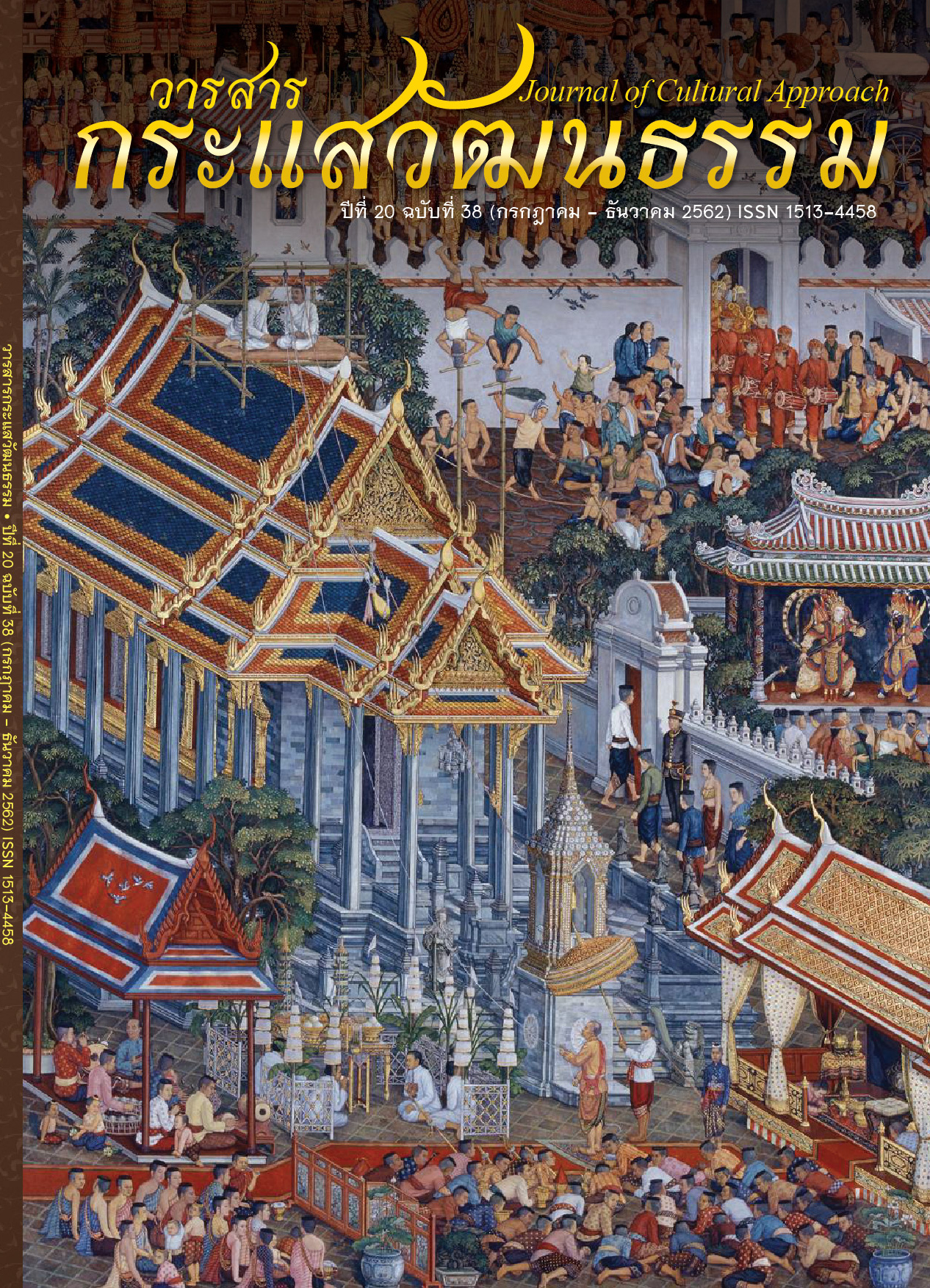สามประสานการท่องเที่ยวทางวัฒนธรรมโดยชุมชนปกาเกอญอ จังหวัดแม่ฮ่องสอน
Main Article Content
บทคัดย่อ
การวิจัยนี้มีวัตถุประสงค์เพื่อ 1) ศึกษาศักยภาพทางวัฒนธรรมของชาวปกาเกอะญอในจังหวัดแม่ฮ่องสอน 2) ศึกษาพลวัตการจัดการท่องเที่ยวทางวัฒนธรรมโดยชุมชนปกาเกอะญอ ในจังหวัดแม่ฮ่องสอน โดยเป็นการวิจัยเชิงคุณภาพ ใช้การเก็บข้อมูลจากการสัมภาษณ์ การสังเกตและการสนทนากลุ่ม ในพื้นที่จังหวัดแม่ฮ่องสอนจำนวน 6 หมู่บ้าน ผลการวิจัยพบว่า
1) ศักยภาพทางวัฒนธรรมของชาวปกาเกอะญอในจังหวัดแม่ฮ่องสอนที่ยังคงมีการสืบทอดในชุมชนนั้นตอบสนองความต้องการดำรงชีวิตบนพื้นฐานของปัจจัยสี่ การสร้างความมั่นคงของกลุ่มสังคม และการปรับตัวเข้ากับธรรมชาติหรือสิ่งแวดล้อม
2) ความสำเร็จของการจัดการท่องเที่ยวทางวัฒนธรรมโดยชุมชนปกาเกอะญอในจังหวัดแม่ฮ่องสอน เกิดจากการที่ชุมชน องค์การเอกชนซึ่งไม่แสวงหาผลกำไรและภาคธุรกิจท่องเที่ยว มีความเข้าใจหลักการพัฒนาคุณภาพชีวิต สามารถประสานการจัดการความรู้ ภูมิปัญญาและวัฒนธรรมในชุมชนเข้ากับการจัดการท่องเที่ยวโดยชุมชน และการท่องเที่ยวอย่างมีความรับผิดชอบอย่างกลมกลืนตามบริบททางสังคมและวัฒนธรรมของชุมชนนั้น โดยมีเครือข่ายการท่องเที่ยวโดยชุมชนจังหวัดแม่ฮ่องสอนเป็นศูนย์กลางการถ่ายทอดและจัดการองค์ความรู้ การที่ชุมชนใหม่ซึ่งมีศักยภาพทางวัฒนธรรมเข้าร่วมเครือข่าย ทำให้เกิดการแลกเปลี่ยนเรียนรู้ระหว่างชุมชนเก่ากับใหม่ในลักษณะของพี่เลี้ยงและเครือญาติ หมู่บ้านที่ดำเนินการจัดการท่องเที่ยวโดยชุมชนมาแต่เริ่มจะมีความสามารถในการจัดการวัฒนธรรมชุมชนอย่างชัดเจน ขณะที่กลุ่มชุมชนใหม่จะเรียนรู้จากชุมชนเดิม พัฒนาการจัดการท่องเที่ยวทางวัฒนธรรมโดยชุมชนให้เป็นไปตามหลักของการพัฒนา โดยไม่มุ่งหวังปริมาณรายได้จากการท่องเที่ยวเป็นหลัก
Article Details
Proposed Creative Commons Copyright Notices
1. Proposed Policy for Journals That Offer Open Access
Authors who publish with this journal agree to the following terms:
- Authors retain copyright and grant the journal right of first publication with the work simultaneously licensed under a Creative Commons Attribution License that allows others to share the work with an acknowledgement of the work's authorship and initial publication in this journal.
- Authors are able to enter into separate, additional contractual arrangements for the non-exclusive distribution of the journal's published version of the work (e.g., post it to an institutional repository or publish it in a book), with an acknowledgement of its initial publication in this journal.
- Authors are permitted and encouraged to post their work online (e.g., in institutional repositories or on their website) prior to and during the submission process, as it can lead to productive exchanges, as well as earlier and greater citation of published work (See The Effect of Open Access).
Proposed Policy for Journals That Offer Delayed Open Access
Authors who publish with this journal agree to the following terms:
- Authors retain copyright and grant the journal right of first publication, with the work [SPECIFY PERIOD OF TIME] after publication simultaneously licensed under a Creative Commons Attribution License that allows others to share the work with an acknowledgement of the work's authorship and initial publication in this journal.
- Authors are able to enter into separate, additional contractual arrangements for the non-exclusive distribution of the journal's published version of the work (e.g., post it to an institutional repository or publish it in a book), with an acknowledgement of its initial publication in this journal.
- Authors are permitted and encouraged to post their work online (e.g., in institutional repositories or on their website) prior to and during the submission process, as it can lead to productive exchanges, as well as earlier and greater citation of published work (See The Effect of Open Access).
เอกสารอ้างอิง
[2] Chantavanich, Supang. (2006). Analysis of Data in Quality Research. Bangkok: Chulalongkorn University.
[3] Cork, C. (1996). Community–Managed Ecotourism: A Feasibility Survey in Phnom Baset, Cambodia. Master’s Thesis, Canada: University of Calgary Canada.
[4] Ladpala, Nitiporn. (2007). Weaving Occupation: A Case Study of Karen Sakor Weaving Groups in Pamolor Village, Mae Sariang District, Mae Hong Son Province. Master’s Thesis in Education. Chiang Mai : Chiang Mai University.
[5] Pakongsup, Panot. et al. (2010) Patterns and Mechanisms of Marketing of Community Based Tourism Networks Phase 1, Mae Hong Son Province. Mae Hong Son: Local Research Department of Research Fund (TRF).
[6] Sanyawiwat, Sanya. (1997). Social Development Theories and Strategies. Bangkok: Chulalongkorn University.
[7] Sarobol, Sin. et al. (2003). Community-Based Tourism: Concept and Experience in the Northern Area. Bangkok : Research Fund (TRF).
[8] Suansri, Potjana. (2003). Community Based Tourism Handbook. Bangkok: The Responsible Ecological Social Tours Project (REST).
[9] Suthinaragorn, Wandee. (2003). Qualitative Research: Research of Alternative Paradigms. Bangkok: Siamparitus.


